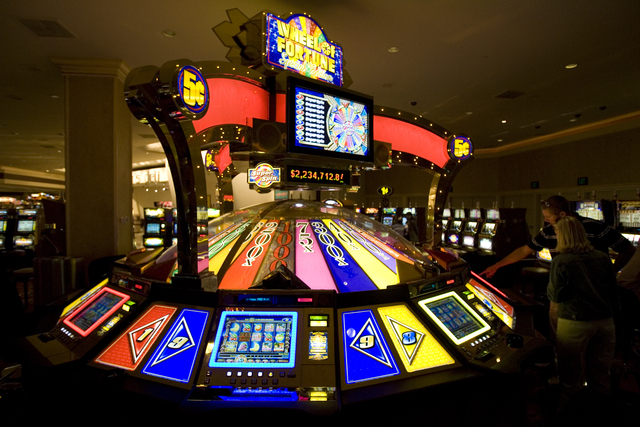Analysts wary of market-share erosion for slot maker IGT

There is a target on the back of slot machine manufacturer International Game Technology.
Despite first-quarter results that were well received by investors, at least two analysts raised concerns in recent weeks that IGT could be bleeding away slot machine market share to the competition.
Credit Suisse gaming analyst Joel Simkins said IGT’s stock price — which has fallen 28 percent since its 52-week high of $21.20 in September — could attract interest from private equity investors enticed by the company’s free cash flow.
“Although valuation looks more interesting and the stock may look attractive to value investors,” Simkins said, “robust competition from more emerging players leaves IGT in the crosshairs of market-share erosion in its core businesses.”
Janney Montgomery Scott gaming analyst Brian McGill said IGT is suffering along with casino operators in regional markets as gaming revenue declines monthly. Customers, he said, are shying from slot machines in which IGT shares in gaming revenue with the casinos.
“IGT has seen a clear deterioration in its base of premium games going back to fiscal year 2007, as its hit ‘Wheel of Fortune’ game has slowly lost popularity,” McGill said in a research note.
He added that the number of “Wheel of Fortune” games has declined from 35,000 at peak to roughly 15,000 games.
“With more competition in the participation segment and the difficult task of trying to replace a hit,” McGill said, “we expect to see the number of premium games continue to decline going forward.”
January seems forgotten.
That month, IGT said its profits increased 21 percent and revenue increased 2.1 percent during the quarter ended Dec. 31 despite “market challenges.”
The biggest challenge may be competition.
Bally Technologies has increased its strength following its $1.3 billion acquisition of rival SHFL Entertainment in 2013. WMS Industries has new vigor after the slot maker was bought for $1.5 billion by lottery industry provider Scientific Games.
Meanwhile, Japan-based Konami Gaming and Australia-based Aristocrat Technologies have boosted their America-based slot machine offerings through their Las Vegas headquarters.
Also, emerging companies, such as Novomatic, which is branching into the United States from Europe; Multimedia Games; Ainsworth Gaming; and other smaller manufacturers are producing slot machines that are slicing into IGT’s base inside U.S. casinos.
“Many of our contacts (in casinos) have indicated they’re buying fewer replacement games,” Simkins said. “IGT has such a large existing share of their floors. Today, there are more choices out there at lower price points with nearly matching performance levels. They can buy fewer IGT games.”
McGill echoed those sentiments, saying IGT’s dominant position in revenue-sharing slot machines has dwindled.
“This trend is likely to continue going forward,” McGill said. “Even if regional markets do begin to improve and grow revenues again, we would not expect IGT to see a material impact in yields.”
So, where does IGT go from here?
The company has made strides in the interactive gaming segment as its much- maligned $500 million acquisition of social gaming giant Double Down Casino in 2012 is starting to pay dividends. The company is considered a social-gaming leader, having made much if its best-known content available in the free-play platform.
IGT has also advanced in online wagering, providing slot machine content to New Jersey’s Internet gaming market.
In this year’s first quarter, the company’s interactive division revenue increased 41 percent, but the raw figure of $74.6 million was the smallest revenue total of the company’s three main segments.
“We credit management for making progress with this business in recent periods,” Simkins said. “IGT is one of the leaders in the rapidly growing social gaming business.”
However, Simkins wonders whether the company can continue the momentum.
“One of the bull case arguments for IGT shares is that it could unlock significant value from this business via a spin or other initiative,” Simkins said.
Which leads to the idea of IGT as a target for potential private equity suitors.
Simkins said the interactive business could be one attraction.
“Although not insurmountable, licensing barriers are high and suitors would face concerns about a structural decline in the slot business,” Simkins said.
Private equity companies TPG and Apollo Management made a significant play in the gaming industry in 2008 when they took Caesars Entertainment (then Harrah’s) private in a $30.7 billion buyout.
“Private equity has shown more interest in the suppliers than previously assumed,” Simkins said.












